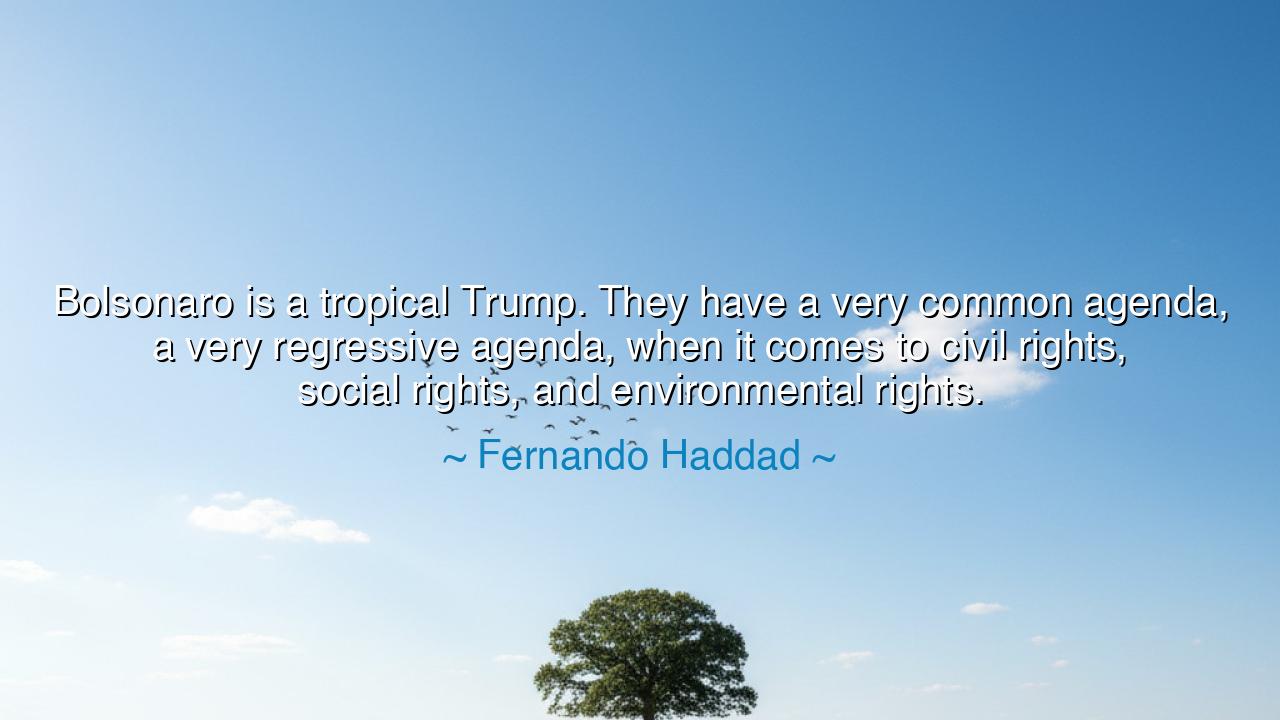
Bolsonaro is a tropical Trump. They have a very common agenda, a
Bolsonaro is a tropical Trump. They have a very common agenda, a very regressive agenda, when it comes to civil rights, social rights, and environmental rights.






When Fernando Haddad spoke the words, “Bolsonaro is a tropical Trump. They have a very common agenda, a very regressive agenda, when it comes to civil rights, social rights, and environmental rights,” he was not merely comparing two men. He was warning of a pattern — a shadow that moves across nations when fear disguises itself as strength, when populism wears the mask of patriotism, and when the cry of the people is twisted into a weapon against their own freedom. Haddad’s words echo like the warnings of old prophets, urging us to see the storm before it arrives, to remember that the fate of one land often foretells the fate of another.
In the figure of Bolsonaro, Haddad saw not a leader, but a mirror reflecting a world where arrogance is mistaken for courage and cruelty for honesty. By calling him a “tropical Trump,” Haddad spoke to the spreading fire of authoritarian populism — a movement that claims to defend the people while eroding the very foundations of their liberty. Like the fevered kings of old who promised order through conquest, these modern rulers charm the crowd with grand gestures and simple enemies: the foreigner, the dissenter, the environmentalist. Their kingdoms are built not upon justice, but upon division and denial.
Throughout history, the tale repeats. When the Roman Republic decayed into the Empire, men cheered Caesar’s name as he seized the liberties of the Senate. When the forests of Europe fell to fuel the fires of industry, few heard the forests’ dying cry. So too, in Brazil and beyond, the environmental rights Haddad defends are trampled beneath the boots of ambition. The Amazon — the lungs of the Earth — burns while speeches proclaim prosperity. The rivers carry ashes where once they carried life. This is not mere politics; it is the forgetting of the sacred balance between man and the world that shelters him.
Yet Haddad’s warning also speaks of civil and social rights, the twin pillars of human dignity. To call their agenda regressive is to reveal its true nature: a turning backward, away from empathy, toward domination. Women, minorities, the poor — all those who seek a share in the promise of equality — find themselves pushed once more to the margins. It is the ancient struggle of the strong against the just, the powerful against the wise. But as the ancients taught, power without virtue is but a brief flame before the darkness.
Consider, then, the story of the dictatorships of Latin America in the twentieth century. Men in uniforms promised safety from chaos; they spoke of order, of family, of tradition. Yet their prisons filled with poets and teachers, and their nations were left scarred with silence. History remembers their reigns not for their strength, but for their fear — fear of truth, of compassion, of the light that exposes cruelty. So it is with every age: when leaders despise the tender values of humanity, they sow ruin, even as they promise greatness.
The lesson that Haddad’s words carry is timeless: beware the leader who claims to speak for “the people” while silencing the human spirit. A society’s strength is not measured by the loudness of its rulers, but by the kindness of its citizens. The true patriot defends not only the flag, but also the forest, the neighbor, and the stranger. The true nation is one that protects the weak as fiercely as it celebrates the strong.
And so, to those who hear this message — act not with despair, but with vigilance. Speak when silence is demanded. Plant when others burn. Defend the dignity of all life, not because it is easy, but because it is the duty of those who still remember the sacred trust between man and Earth. Haddad’s cry is not merely political; it is moral, even spiritual — a call to awaken the better angels of our shared humanity.
For in every age, there are two fires: one that consumes, and one that illumines. The first is the fire of ambition, which devours forests and freedoms alike. The second is the fire of conscience, which warms the heart and guides the lost. Haddad reminds us to choose the latter — to keep it burning, even in the storm — for the future belongs not to those who shout the loudest, but to those who guard the light when the world grows dark.






AAdministratorAdministrator
Welcome, honored guests. Please leave a comment, we will respond soon